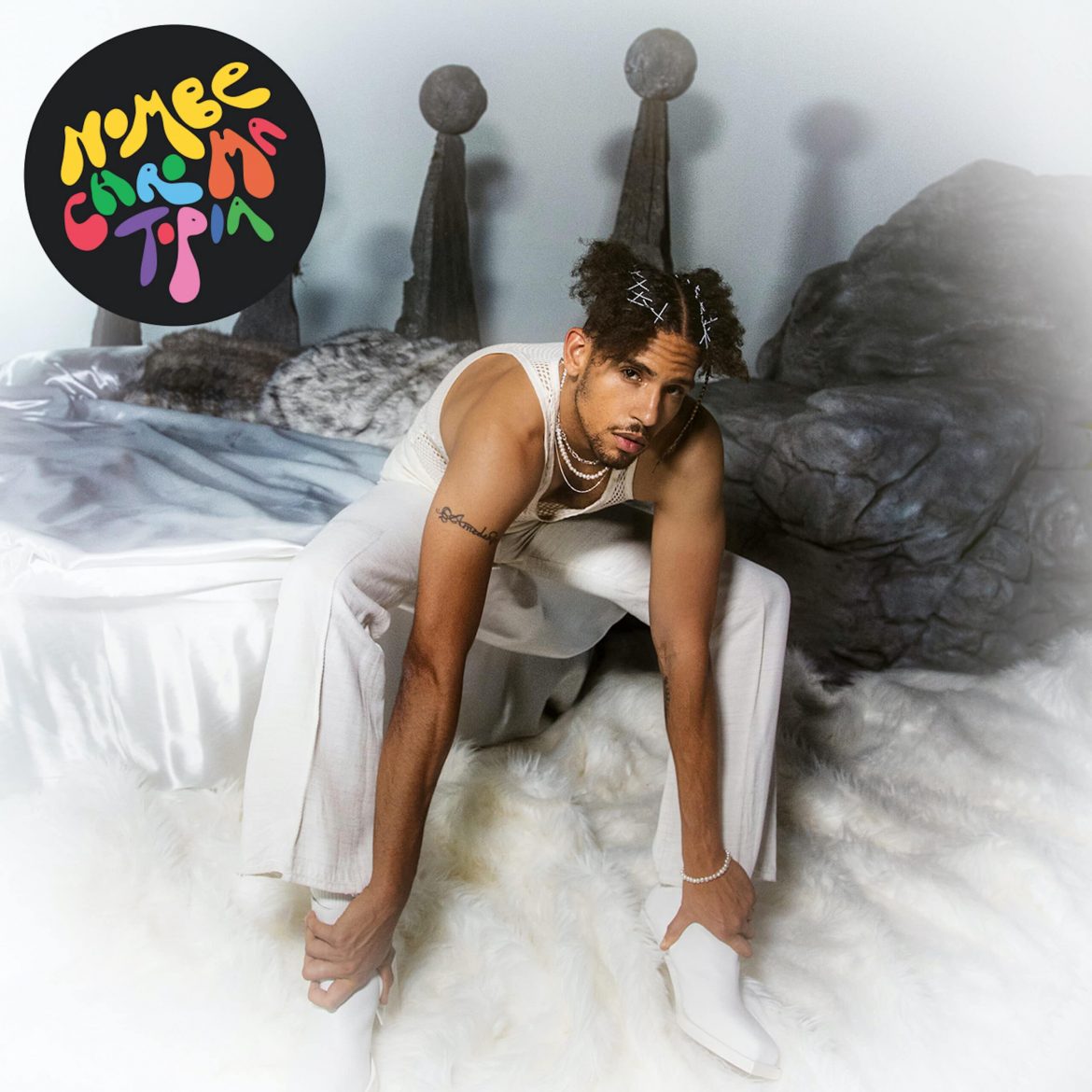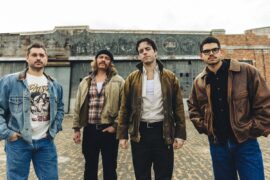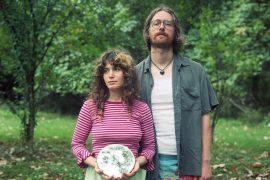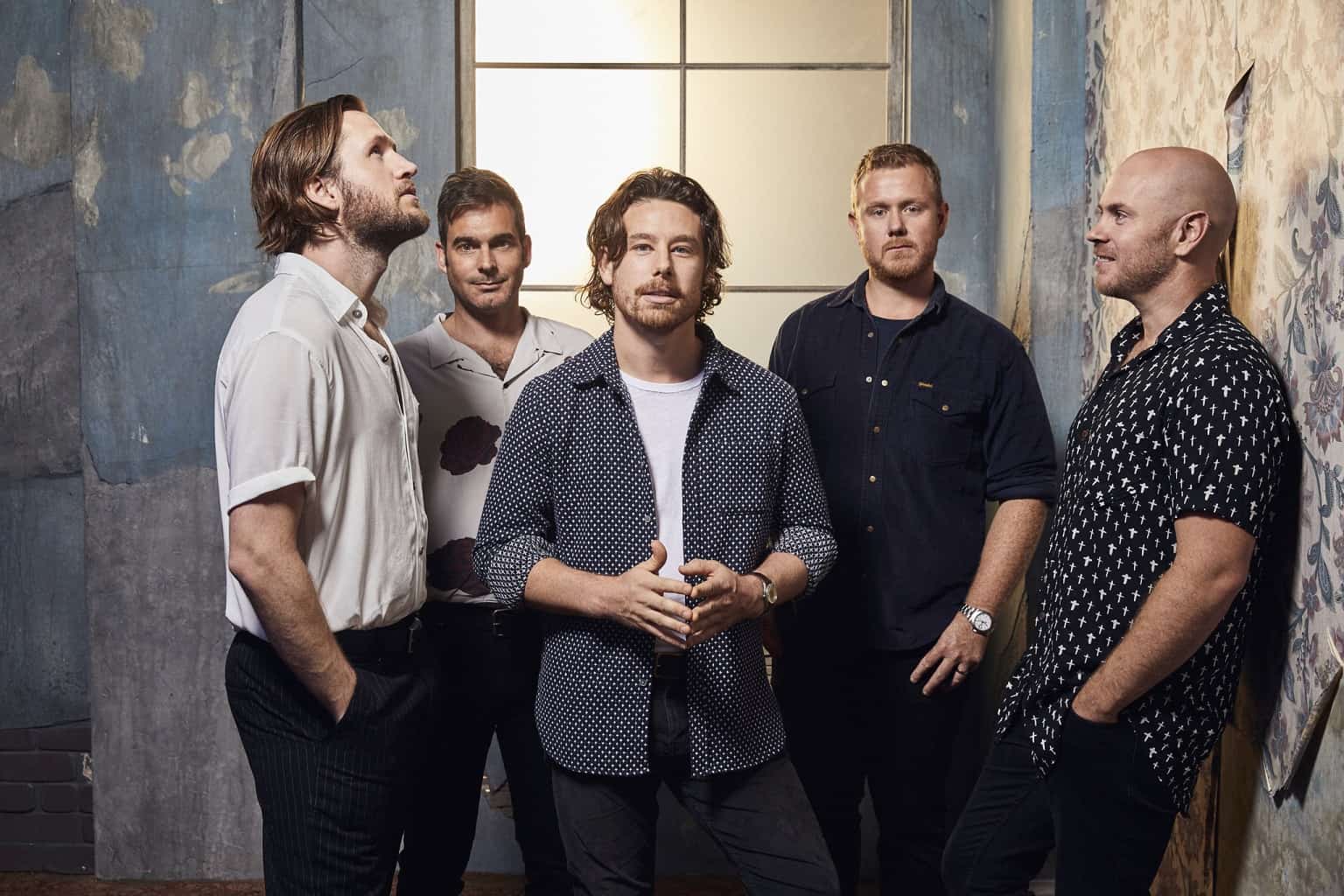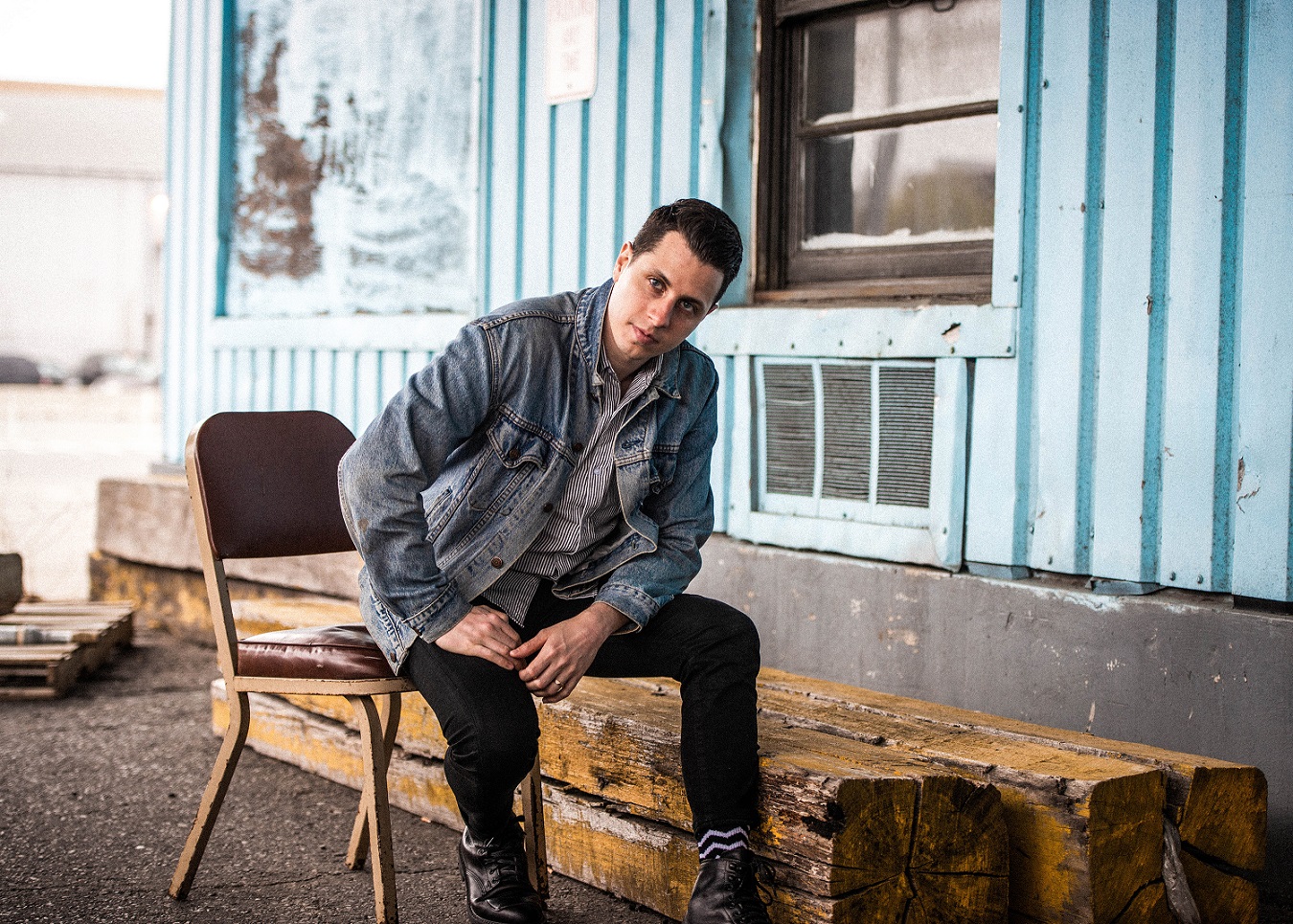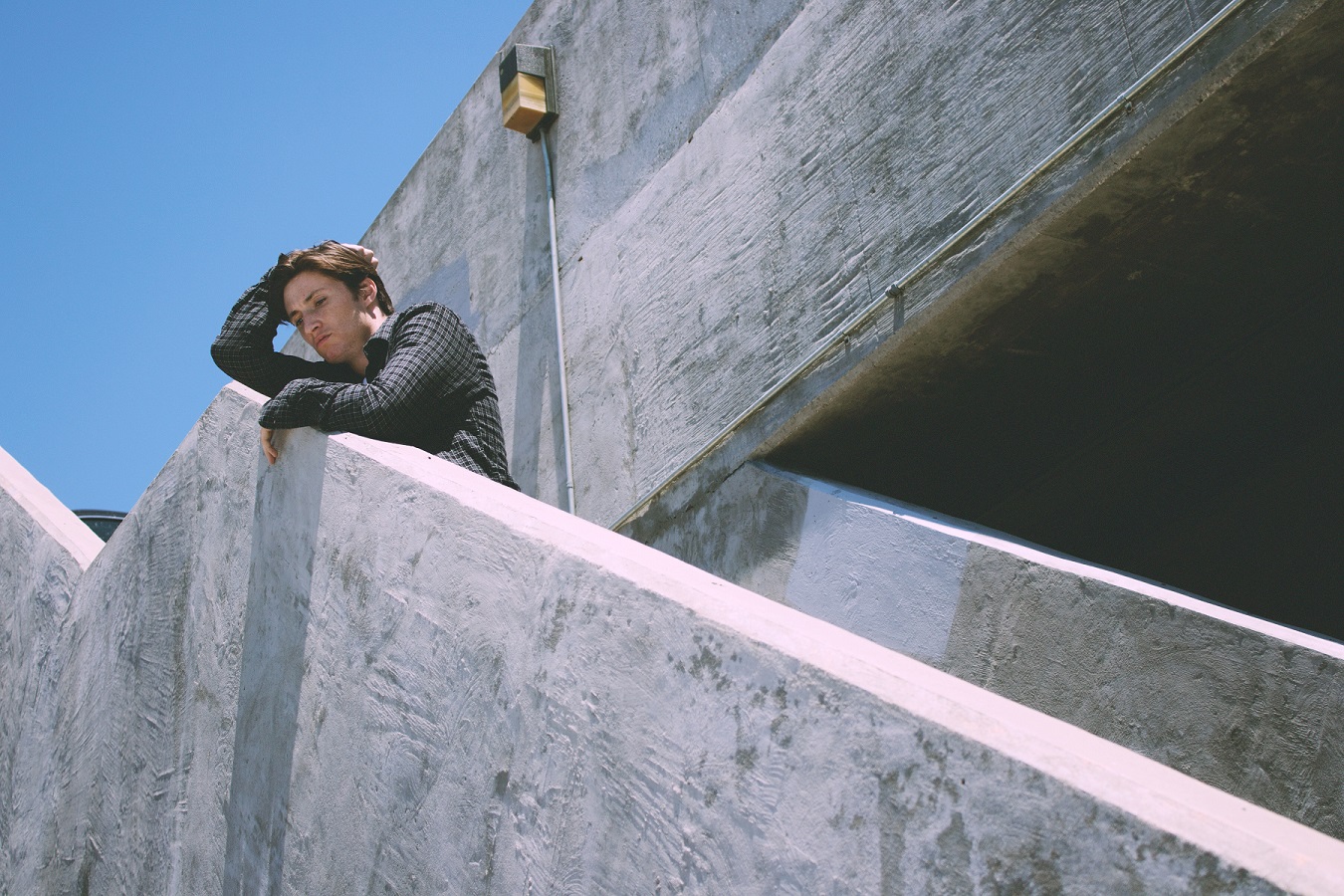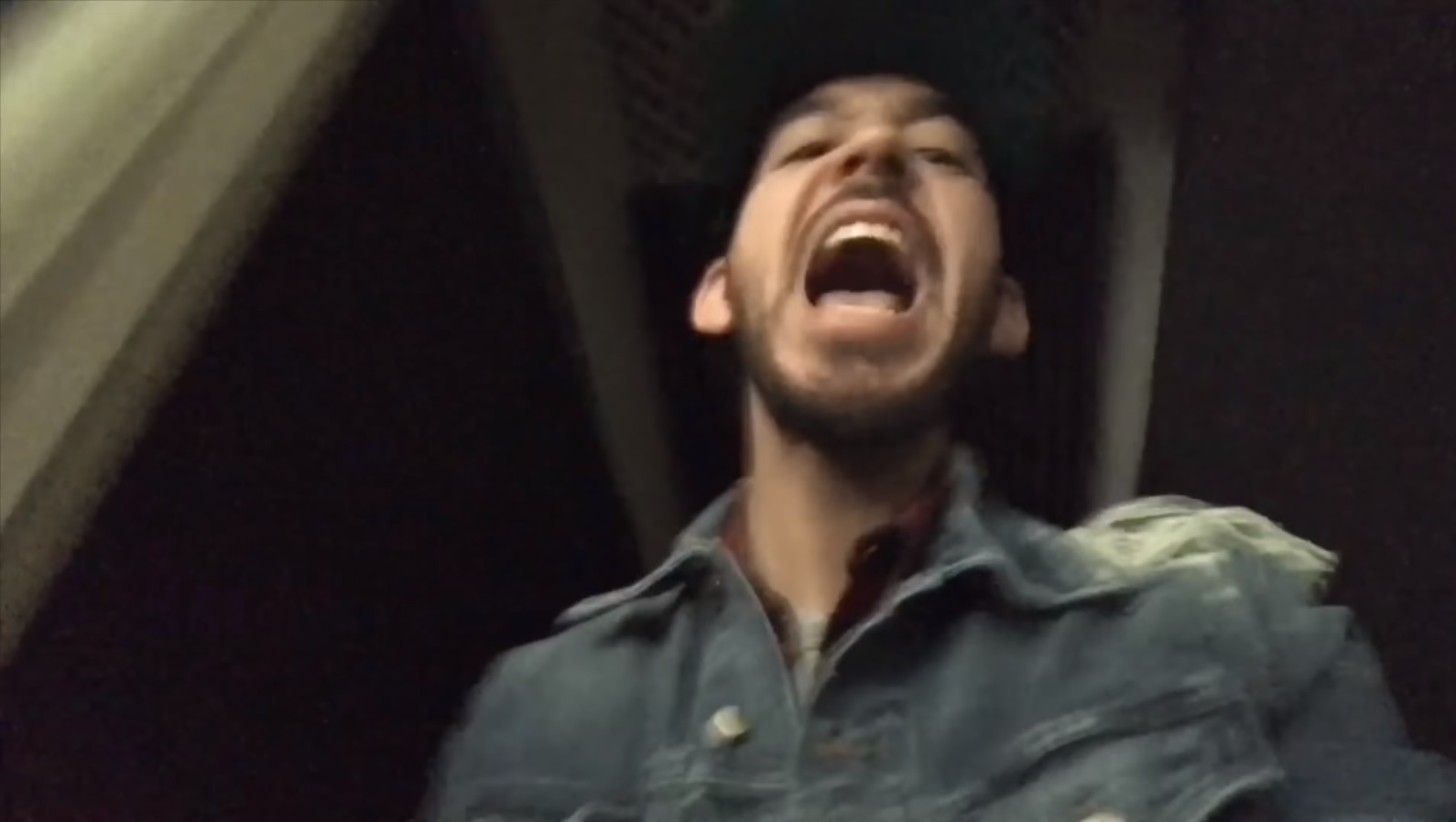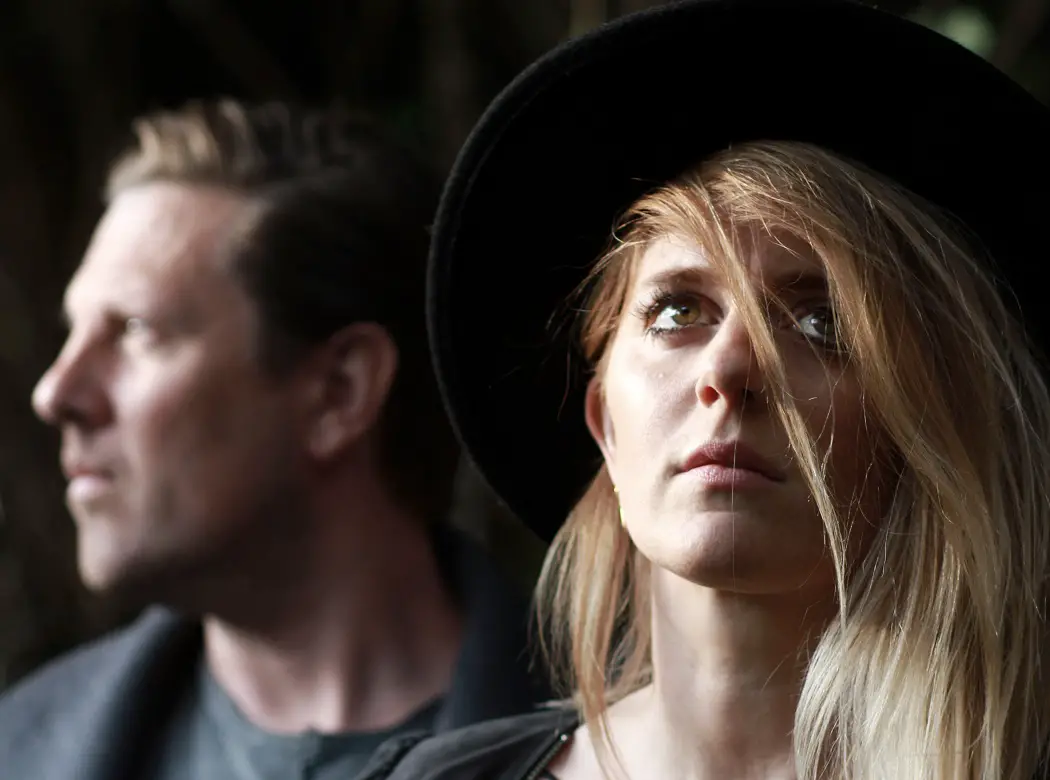NoMBe dives into the depths of his beautifully kaleidoscopic and vulnerable sophomore album ‘CHROMATOPIA,’ a breathtaking rainbow of lush, soaring sounds and intimately stirring emotions.
Stream: ‘CHROMATOPIA’ – NoMBe
I think everybody falls on a spectrum somewhere, the way the color blue slowly turns teal and turquoise, you never know when really green starts and when blue ends.
A beautifully kaleidoscopic and vulnerable experience, NoMBe’s sophomore album is a rainbow of lush sound and stirring emotion.
Exploring the spectrum of sexuality, intimacy, love, loss, isolation and more, CHROMATOPIA (released May 7, 2021 via TH3RD BRAIN) is a musical and conceptual triumph that brings us up-close and personal as Noah McBeth parses his relationship apart piece by pieces, moment by moment.

Never been a sucker for commitment
Since High School high standards, high living
Turns out I never knew what I was missing
‘Cause Goddamn when I’m with you it feels different
We go together like treble and bass
Like colors and spring
Cool kids and cocaine
You’re the only vaccine
To cure the mundane
I guess what I’m saying
Is that you’re a weirdo
But I wouldn’t have it any other way
You’re no superhero
Still you’re the one who’s always saving me
Only one in seven billion makes me feel it, can’t you see?
That only a weirdo, a weirdo
Could love someone like me
“This new album is about one person, about one relationship, and it is an album that basically unfolds in real time,” the artist – a longtime Atwood favorite – explains. “It’s something that I was writing as it was happening and still is happening, and sort of the doubts of the relationship, the ups and downs, where you’re joyful, you’re excited, you’re in love, but also you’re afraid that you might not last, you’re afraid of, ‘If we break up, how am I gonna cope with seeing you with somebody else?’ And so it’s sort of a conceptual break-up album about a person I’ve been dating for eight years now, out of which we’ve been also seeing other people a large portion of that, and how that’s been incredibly interesting. It’s been incredibly healthy in some ways, and it’s been unhealthy in other ways.”
The follow-up to NoMBe’s heavily-lauded 2018 debut album They Might’ve Even Loved Me (reviewed here, featured interview here), CHROMATOPIA arrives three long years later with a fresh, buoyant sound that pushes the artist’s “psychedelic soul rock fusion” signature forward in new directions. Classical motifs, R&B grooves, pop licks, and more make this NoMBe’s most experimental and expansive offering yet. It’s astral, it’s romantic, it’s colorful, and it’s baroque – a pool of emotionally potent, by and large uplifting material that unveils a world of deep reflection, connection, and wonder.
I know that you’re anything but simple
And I love the complexity within you
Momma told me I was meant for something special
And god damn I found it when I met you
We go together like sex and cheap thrills
Bad whiskey and pills
Cool kids in the hills
The way you carry yourself
You do it so well
I swear I won’t tell…
that you’re a weirdo
And I wouldn’t have it any other way
You’re no super hero
Still you’re the one that’s always Savin me
Only one in 7 billion makes me feel it
Can’t you see
That only a weirdo … a weirdo
Could love someone like me
NoMBe contains multitudes, and he wants his art to reflect that truth.
“When you start out as an artist, you kinda put out what’s finished,” he shares. “I was way more trying to be enigmatic and not show my face and have this really dark sound [when I was starting out]. It felt refreshing to make more upbeat music – it just felt good, and I just enjoyed things like Hall & Oates and MGMT and some of the indie bands I really respected that made cool dance music. I’ve always loved it. I’ve always loved French House. I’ve always made French House, it’s just something that I would show people and be like, ‘Whoa, that’s so cool. It sounds like a different person,” and I would never put it out.”
“Now I was like, ‘Hey, I’m gonna try to combine all those things.’ It’s not my intention to alienate anyone, but I’m also not gonna just do the same thing over and over. I have some songs on the record that are more like They Might’ve Even Loved Me, like “To the Moon and Back” could have totally been on that album, and there are rock moments, but it’s just an evolution because I was in a different place and it required a bit of a change, which opened it up for me to now go wherever I want from here. I feel like it wouldn’t be weird if I went more into that direction, or if I went in a really gritty rock direction, or if I made an album where I rap more. I like having the freedom. One of the worst things is when people tell me how I should sound or expect me to sound a certain way – that’s like a nightmare to me. I want to be able to do something completely different tomorrow.”
The title CHROMATOPIA is a re-appropriated term inspired by a book on color theory, entitled “Chromotopia.” The name eludes to the rainbow of music housed within the record’s 41 minutes. “There’s this color filter I like using when I edit my videos, which is called Chroma shift, and it basically adds this color view around everything,” NoMBe says. “After releasing They Might’ve Even Loved Me, we basically decided collectively as a company, and with the label, I wanted it to feel different, I wanted it to feel more colorful, less gritty, less ’90s rock, Lenny Kravitz and a bit lighter and more colorful. [My second album] was originally going to be gritty and more like maybe like a Two Feet mixed with something mixed with Lenny and whatnot, but all the stuff I was writing was so much lighter and dancier and more Empire Of The Sun – more like maybe Tame Impala or Gorillaz, MGMT.”
“I think it was just a natural evolution, and I was very happy that we sort of came up with that. And that’s where this phrase, “Love is a spectrum,” comes from, which is the Japanese lettering that is on some of the new cover art. I was very inspired by Japan throughout this process for many, many reasons. I think Japanese pop culture of the ’80s is super-interesting, very colorful, very whimsical… it’s still an indie record, it’s still an alt record, but it has a lot more piano, which was a very deliberate decision.”
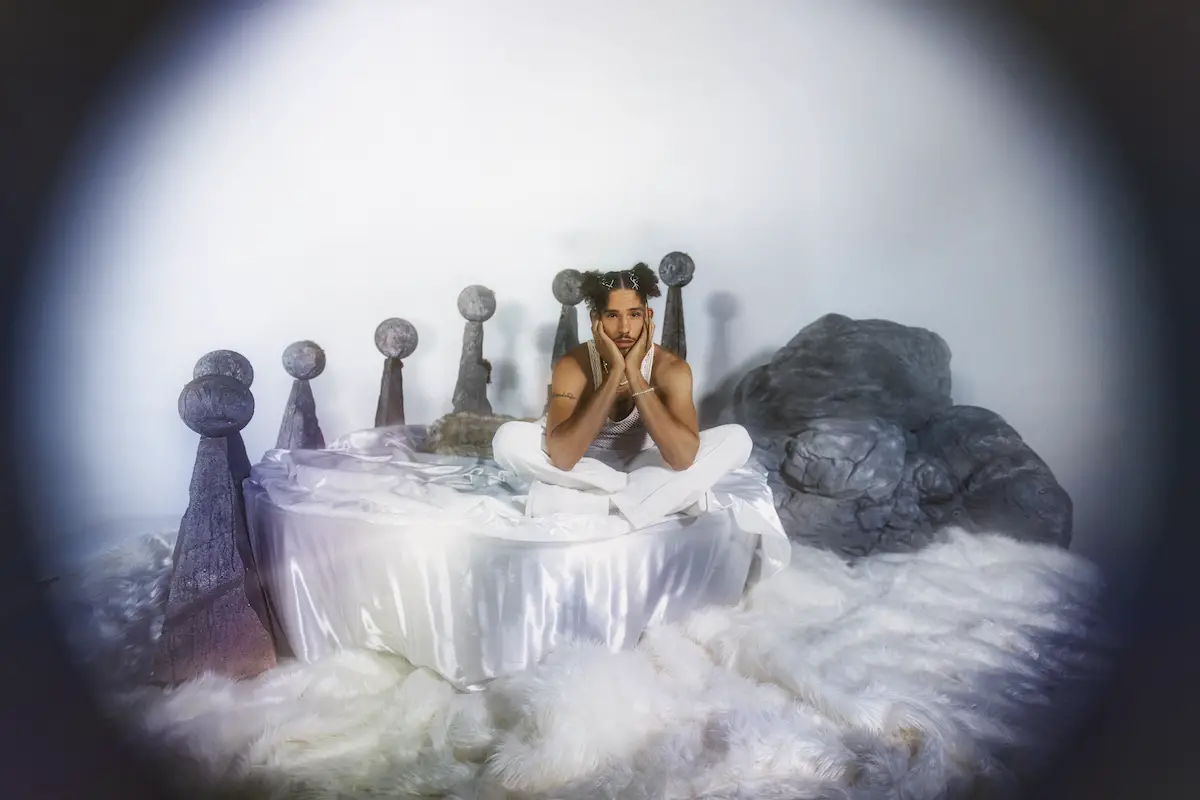
CHROMATOPIA was initially intended for early/mid 2020, but the COVID-19 and extenuating circumstances led NoMBe to push his LP’s release out by a full year. Its initial rollout included the singles “Paint California” (a trippy, upbeat dance party), “Prototype” (groovy, bustling R&B bop), and “Weirdo,” which Atwood Magazine previously described as “beautiful and gripping outpouring of love and self-love wrapped in lush alternative and psych-rock garb.” Driven by dulcet pianos and sweetly effected guitars, “Weirdo” is an honest and heartfelt love song full of vulnerability, affection, and hope.
Another early standout was “Heels,” an upbeat, infectious, and charming pop song with rich harmonies, phat n’ fun bass lines, and wicked guitar licks. A funky, heart-on-sleeve earworm collaboration with Art Johnson, “Heels” finds McBeth baring his deepest pains in a passionate apology: “Understanding that you have caused someone you care for pain and therefore deserve for them to ‘walk all over you,'” per the artist.
From the groovy, smoldering album opener “Something to Hold Onto” and the irresistible upheaval “Boys Don’t Cry,” through the poignant, shiver-inducing “This Is Not a Love Song,” the feverish, epic climax “Water into Wine,” and ultimately the classical piano instrumental closer “Happy Birthday, Frank!” (written and performed for Frank Ocean on his 30th birthday), CHROMATOPIA is an arresting, immediate, dazzling, and endlessly alluring journey into NoMBe’s heart, mind, and soul.
“I hope people will pick up on some of the concepts and themes,” NoMBe says of his new record. “As music travels, it gets picked apart, and re-used and re-branded, and not everybody’s gonna get this in-depth conversation that we’re having right now, so I can only hope that people can find maybe their own meaning, or that it will help them see the world a little differently. I hope they enjoy it, on a very simple level. I hope they can dance to it and share it, that it brings them joy, and makes them forget the craziness we’ve been through the last year.”
Thick ways are pounding
Steady while you make me cry
Oh lord, feels like I’m drownin’
Every time I think of you and I
So baby won’t you turn my water into wine
Baby won’t you turn my water into wine
Say it what you will, what you want, don’t say goodbye
Don’t say goodbye
Breathing gets harder
As holy water fills my eyes
Knees deep in darkness
Struggling to see the light
Utterly enchanting and beaming with soul-stripped grace, beauty, CHROMATOPIA is NoMBe’s colorful, intimate, heart-on-sleeve wonderland.
Dive into this stunning record in our exciting in-depth interview below, where NoMBe discusses CHROMATOPIA‘s musical and thematic inspirations, writing about his relationship in real time, opening himself up, and more.
“You have to remember, it’s not like one moment and I write a whole album that moment,” NoMBe reminds us. “it’s like a year of me going to studio to write a song for a few weeks, and then it’s going good and I write another song, and then a month later we actually break up and now I’m writing that song – and so it’s like that limbo, the ups and downs of a relationship, that created a whole ‘nother spectrum, because there were points in the album where I really thought we weren’t gonna be together and quite frankly, I don’t know if we will now. That’s why it’s so deeply personal and so current for me of an album, and it really dives into something that is [real for me]. None of it is exaggerated for anything. It’s not based on a true story; it is a true story.”
CHROMATOPIA is out now.
— —
:: stream/purchase CHROMATOPIA here ::
A CONVERSATION WITH NOMBE
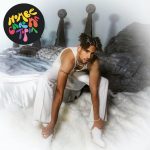
Atwood Magazine: Noah, before we get into things, how have you and your family have been doing? I know you moved to Hawaii…
NoMBe: Well, I don’t have blood family in Hawaii, but I have people who I call my family, the extended Ohana as they call it, and originally, I moved to Hawaii because an artist that I’ve worked with, you might know of the name Beauville we have a song “Letting In” together, and he moved there and I basically sign up to produce his EP as well, and so that was initially it. And I am even thinking of bringing my family there, having my dad and mother retire there, but for the most part, it is just me, but everybody’s good. Everybody made it through the pandemic thus far. Still sane, somewhat, as sane as you can be. And I feel incredibly motivated, creatively, just very excited about the future and new music and everything.
When we spoke years ago now, you were talking to me about already having the next album under the belt, and here we are now talking about this new album! You wholeheartedly paused your release schedule last year though. What has it been like to revisit the record now, over a year later?
NoMBe: It’s odd. Of course, I think it was necessary. At the same time, I think we’re in a better place now on every level. I think we have more music videos in the pipeline, I feel more prepared mentally, I feel ready, and last year I felt like everything was out of my hands and this was album was scheduled to be on streaming services, but I felt like… It almost felt like people didn’t care, it’s a weird feeling for an artist, I didn’t feel like I was getting the press coverage I was hoping for and things like that, and I think now with re-engaging people with more music videos and a more strategic approach and people are a bit more wanting art in their life. I think last year people were just like so in survival mode that I’m actually relieved that we took some time and are now back in a better place, and in the grand scheme of things, people are not gonna really think about that. You know what I mean? If I think about… I don’t know if I think about Bob Dylan’s third album, like I don’t care if he had a year delay or if he had some weird emergency, like eventually it’s gonna be out and it’s going to be enjoyed, and that’s all that matters. And in the moment, it’s like a crisis, but whatever serves the record well and what serves the people well, that’s more important.
I like that perspective. So this album is a very long time in the making. Can you share a little about the story behind CHROMATOPIA?
NoMBe: Chromatopia – it is a re-appropriated term, it is a book on color theory – the book is actually spelled with an o, Chromotopia, but Chromatopia had a better ring to it. There’s this color filter I like using when I edit my videos, which is called Chroma shift, and it basically adds this color view around everything, but the word itself is from a book on color theory that my creative director had. After releasing They Might’ve Even Loved Me, we basically decided collectively as a company, and with the label, I wanted it to feel different, I wanted it to feel more colorful, less gritty, less ’90s rock, Lenny Kravitz and a bit lighter and more colorful, and as all the demos I had left over from They Might’ve Even Loved Me as I worked on them and added new songs, and I think I went into Chromatopia into that process with about 70 to 100 demos, and as I completed them, all the heavier rock stuff kind of fizzled out, I really set out making this album originally being called Electric Soul.
I don’t know if you remember that at all, but it was going to be gritty and more like maybe like a Two Feet mixed with something mixed with Lenny and whatnot, but all the stuff I was writing was so much lighter and dancier and more Empire Of The Sun – more like maybe Tame Impala or Gorillaz, MGMT. Those were sort of things that I had in my head and I was listening to a lot of French House, and any time I sat down to write something, it sounded like this upbeat ’80s kind of thing, and I think when I sent the first demos to the team, they were like, “Hey, this doesn’t sound like electric soul, this doesn’t sound like what you said you were gonna do.” And I’m like, “Well, this is what I’m doing. This is kind of it.” And so we were like, “Well, let’s maybe work with some branding people,” and I found this amazing woman, Belle Downey from Australia, and her partner Amber Horsburgh who came to us as digital marketers and then just sat down with me one day. And we got lunch, and they were like, “Hey, what’s the story?” And I told them about the ups and downs of my relationship and having for the past years opened things up and us seeing other people and where I’m at with life, how I just see gender and sexual orientation and relationship status. I’ve just become a lot less rigid with these ideas, and I think everybody’s on a spectrum. I think nobody’s 100% straight male, masculine, all manhood.
I think everybody falls on a spectrum somewhere, the way the color blue slowly turns teal and turquoise, you never know when really green starts and when blue ends. And so in this conversation, they were like, “Yeah, it sounds to us like you’re a lot more… These are very bright, positive concepts, very progressive concepts. It doesn’t sound like the guy who’s wearing bandanas and is just this rock star.” I think it was just a natural evolution, and I was very happy that we sort of came up with that. And that’s where this phrase, “Love is a spectrum,” comes from, which is the Japanese lettering that is on some of the new cover art. I was very inspired by Japan throughout this process for many, many reasons. I think Japanese pop culture of the ’80s is super-interesting, very colorful, very whimsical.
I’m a big fan of the scores of Anime, the sort of melancholy that you find in Anime music, almost like a soap opera, almost like a cheesy piano in a soap opera. And at the same time the 1980s, the video game scores like Zelda and Nintendo, Mario, a lot of that was classical music. I don’t know if you played much video games in… From that time, but like Zelda… It’s almost like Vivaldi or Tchaikovsky or something. And I know that Japanese composers love baroque and Beethoven and all this, and that’s what I grew up playing. So a lot of the musical themes on the album are basically like the scores of my childhood. It’s like that unlocking that feeling like when you smell something. Like maybe you smell your mom’s perfume as an adult, and you realize, “Oh shit, this is what it’s… What life smelled like when I was 10 years old.” And so for me sonically, the classical mix with these melancholy chords that are not happy, not quite sad, that was sort of the backdrop. And then visually, I immediately went to Anime Japan, robots, Daft Punk, all of those things kind of got… Like how Mozart dressed, those things all became very clear to me. And then I started making mood boards around that and chipping away at that. And that’s why I think the album has some vocoder stuff. I wanted to combine these elements of classical music but also retro, futuristic, modular synthesizers. And of course, I’m gonna do it in my way. Of course, there’s gonna be guitars, and there’s going to be interesting arrangements. And it’s still an indie record, it’s still an alt record, but it has a lot more piano, which was a very deliberate decision. It has classical themes, it has one theme throughout that’s heard in “Chromatopia A”, A, B, and C.
That's fascinating. So there are these musical themes interspersed throughout the album, that create this cohesive, special listening experience.
NoMBe: Mmhm. It’s heard in the second song, “Something To Hold on To”, The chord structure, that is the main theme of the record. And it’s like these little Easter eggs, it’s like, “Oh, track 11 has the same chords as track number 3.” And all of that kind of creatively has its backbone in my childhood. And then quite literally, I went to Japan. I’m still learning Japanese. I was dating a Japanese woman at the time who kinda helped me explain some of the concepts of Japanese beauty and composition and why things are the way they are. And I completely soaked all of that up and took that with me. And when I came back January 2019, I rented an animal farm and started basically actually working. I started actually writing lyrics, sometimes writing verses three, four times till they were right. I just locked myself away for about four months, I think January until April 2019, I was on the farm. I had the theme “Chromatopia A”, B and C. I had those themes that was actually written with Big Data, the artist from New York who had that big hit “Dangerous”, and so he actually came up with those chords and we had a session booked randomly, and I told him I was on this weird classical music thing, and he just sat down, and just played these chords. I was like, “Dude, this is exactly it.” He was like, “Oh, you like that?” I’m like, “Yeah man, but let me play this melody on top.” He had the chords, which is actually a very basic… It’s like just a movement in force going down to scale, which is a very baroque thing to do. I don’t think… How consciously aware he is, he’s a brilliant musician, so I wouldn’t be surprised if he knew that based off of my instruction, and then I just was like, “Keep playing that, keep playing that.”
And so literally he played the chords, I played the melody. And we were both like, “Yeah, this is cool. This sounds like Space Odyssey, this sounds like Bowie or Elton John.” And I was like, “Yeah. But it’s also kind of classical,” so I made it a synthesizer’s song, but I wanted the piano version to still be on the album, which is “Chromatopia B,” I think. It’s B or C but… No, it’s B, it’s B. And that was like the world. That was the main part of the world, and then while I was doing that, I wrote ‘Paint California’ with some friends, with Kyle Moorman and Kam Alexander, both incredible producers and writers. And it started from there. ‘Paint California’ was the first single that I think everybody was like, “Oh yeah, this could be a thing.” It has keys, but it has your old sort of rock sound, it has a drop, it feels kind of like Empire Of The Sun, if that was like their new… I don’t know. It felt a lot like Empire Of The Sun to me. I think early on, I actually talked to the main writer in Empire Of The Sun and we were talking about it being their song.
So “Paint California” almost became their song, or maybe even a remix, but it ended up not working out the way it did and then it became the first single off my record, and the idea of paint in “Paint California” fit into the album concept perfectly. It’s so weird how these things happen, like you push a little bit, then you get something back then you refine it, then it’s still not there, and then something coincidental happens that is woven into it.
That was the best kind of introduction to this album that I could have. Let's take a step back for a second: I think it's really interesting, this idea of 'Chromatopia' and color theory, that you use it as the canvas on which to create such a colorful soundscape in music, that's inspiring. You dedicated your last album to all the women in your life, and what I felt was interesting about this record is that it felt so intimate and yet so expansive at the same time. How did the songwriting experience for this one change for you, between your last record?
NoMBe: As you said, the last album was about many different stories and people, a song about my mom, a song about bad break-ups, songs where I’m sort of saying, I’m not perfect or I broke someone’s heart or songs that are just about young love, like young hearts. This new album is about one person, about one relationship, and it is an album that basically unfolds in real time. It’s something that I was writing as it was happening and still is happening, and sort of the doubts of the relationship, the ups and downs, where you’re joyful, you’re excited, you’re in love, but also you’re afraid that you might not last, you’re afraid of, “If we break up, how am I gonna cope with seeing you with somebody else?” And so it’s sort of a conceptual break-up album about a person I’ve been dating for eight years now, out of which we’ve been also seeing other people a large portion of that, and how that’s been incredibly interesting. It’s been incredibly healthy in some ways, and it’s been unhealthy in other ways.
And so you have the lowest points in the record emotionally that are probably “This Is Not a Love Song,” “Water into Wine,” where it gets dark. I’m talking about dying, I’m talking about being very lonely, I’m talking about either drowning or having basically faded away from just this loneliness, and then you have the more euphoric statements on joy and love like “Paint California.” And you have hopeful sort of songs like “Prototype” that’s like, “I can be a better version if you like ’cause as far as I’m concerned, you only met the prototype.” Meaning I’m still in my beta stage, you haven’t met the finished product yet. And I like that because that is also the sort of parallel to that robot theme we were talking about. There’s a lot of subtle hints at these technological concepts, but also space. “This Is Not a Love Song,” “To the Moon and Back,” “Boys Don’t Cry” is about my engines going out to a spaceship. “Something to Hold Onto” is talking about coming back into the atmosphere and crash landing. So the piano fit in really nicely because I think it’s a concept that we’re familiar with through Elton Johns and David Bowies.
I don’t think… Or I think loneliness is really well captured when you look at an astronaut and space travel, because there’s just so much vastness and you’re so far away from the world, and it was one of the first things that came to me when I thought about this isolation, which really came out of my relationship, but also society, and me not really being comfortable with where technology’s heading, where any time you have a problem, you’re on the phone with a machine for an hour before you get to anything real and people are only communicating in their phones and all of that kind of culminated in me writing the record before a pandemic. I didn’t know there was going to be a pandemic when the record was made, so it felt so real like… It felt like a self-fulfilling prophecy because I was about to release the album April 2020, literally when everything shut down and I was like, “Did I manifest a global pandemic with writing this?” I’m not that big of a narcissist to actually think that, but it was just so odd. I was like, “Wow, now I actually have to be alone.” As you can tell, there’s a lot of like… I always call them micro and macro themes. There’s the very personal theme, there’s the society theme, there’s the love theme, the philosophical theme of gender and sexual orientation, and why there is so much color there – and that’s why to me, I think it’s a good record. There is the fauna and flora, there is the chords, and you can dance to it and there’s the music, but I think there’s a lot of layers that took a lot of time. There’s a lot of thought going into why everything is the way it is, and my favorite albums have that.
There’s the very personal theme, there’s the society theme, there’s the love theme, the philosophical theme of gender and sexual orientation, and why there is so much color there – and that’s why to me, I think it’s a good record. There is the fauna, and the flora.
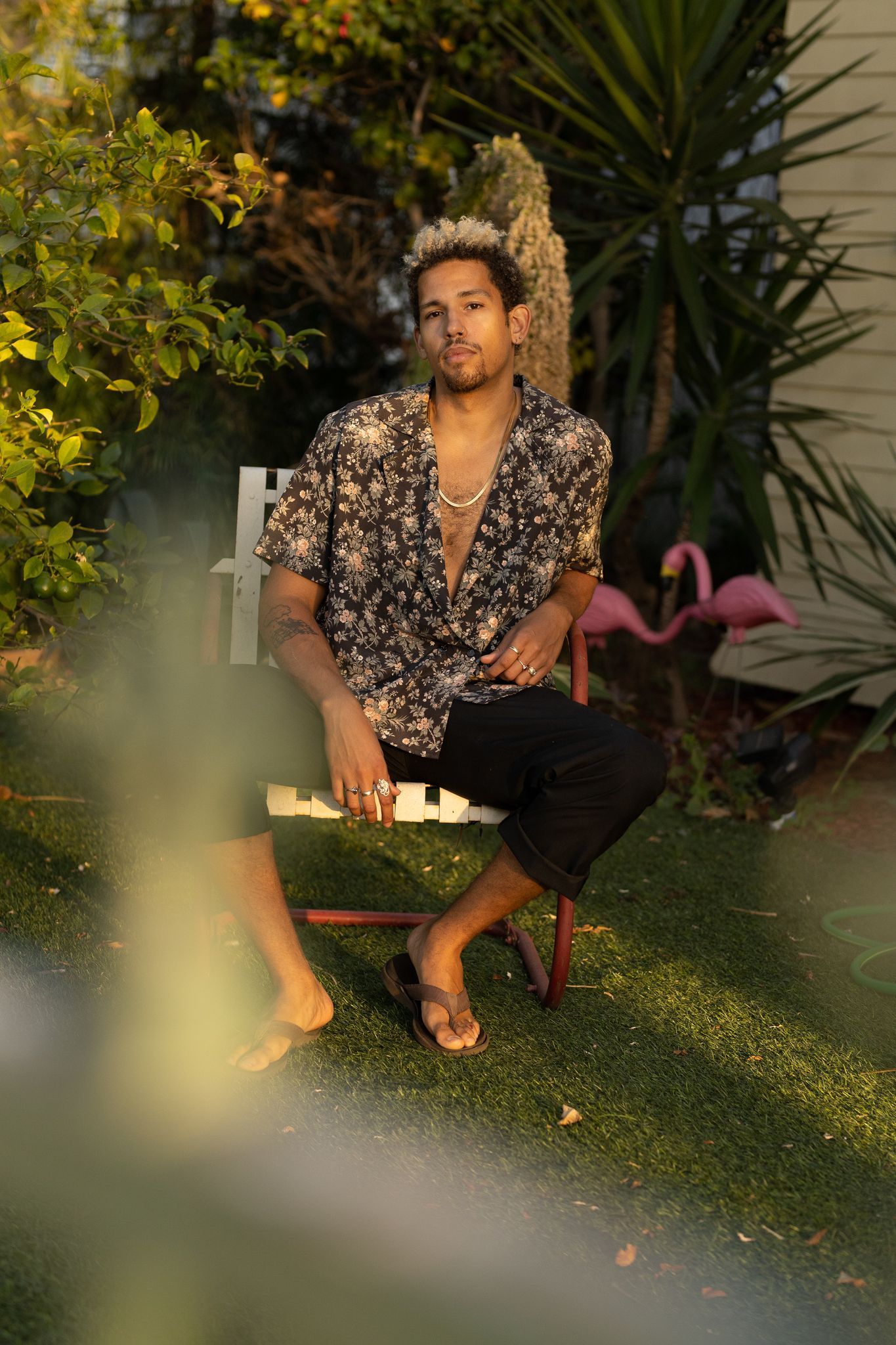
Yeah. It's astral, it's romantic, it's colorful, it's baroque. It manages to be all these things at once, which I think is just a testament to the love you put into it. Let's... You talked about the fact that you found you were writing more colorful songs than you perhaps intended to. With the time that you've had to reflect on it, what drove you toward these more uplifting sounds and songs?
NoMBe: I think it was always something I was making on the side, and I never had the quite confidence to actually go there. I think a lot of the songs… When you start out as an artist, you kinda put out what’s finished and starting with my first EP to then “California Girls” and things, I was way more trying to be enigmatic and not show my face and have this really dark sound. And it felt refreshing to make more upbeat music, it just felt good, and I just enjoyed things like Hall & Oates and MGMT and some of the Indie bands I really respected that made cool dance music. And I’ve always loved it. I’ve always loved French House. I’ve always made French House, it’s just something that I would show people and be like, “Whoa, that’s so cool. It sounds like a different person.” And I would never put it out.
And I think now I set aside, I was like, “Hey, I’m gonna try to combine all those things.” And it’s not my intention to alienate anyone, but I’m also not gonna just do the same thing over and over. I have some songs on the record that are more like They Might’ve Even Loved Me, like “To the Moon and Back” could have totally been on that album, and there are rock moments, but it’s just an evolution ’cause I was just in a different place and it required a bit of a change, which opened it up for me to now go wherever I want from here. I feel like it wouldn’t be weird if I went more into that direction, or if I went in a really gritty Rock direction, or if I made an album where I rap more. I like having the freedom. One of the worst things is when people tell me how I should sound or expect me to sound a certain way, that’s like a nightmare to me. I wanna be able to do something completely different tomorrow.
I think that's always been part of your aesthetic is that you are gonna make what you wanna make and people wanna put you into a box that's fine, but you're not gonna look up to their expectations, so you accidentally created a soundtrack to isolation before the most isolating time in living memory, how has your relationship with these songs grown over time?
NoMBe: Oh I still feel them very, very deeply and personally. One of the funny things with artists, especially on their first album is by the time you hear it, chances are the artist moved on from that subject. It’s like when you hear Frank Ocean, “Think About You,” like that song was made probably two years earlier and was that story happened 10 years earlier. The same way, my song “Wait” or “California Girls” were pretty old by the time they came out, and so this album, when it comes out tomorrow, it’s how I am feeling right now, and that’s also really cathartic, and it feels like I am on the right timeline. It doesn’t feel like, “Oh shit, but you wait til you hear the new thing and it’ll come out in two years,” it’s like the songs grew well with me over the last two, three years, and I love them, I love the body of work. One of the questions I have gotten the most the last few weeks is, what’s your favorite song? And I can’t really… I don’t look at it like that. I think if it comes out, I generally love it and I stand behind it, and maybe I have the top five, but I think the body as a whole is the thing. I don’t know if it sounds like cheesy, but you wouldn’t ask a painter like, “Hey, which 2×2 inch part of the painting is your favorite part?” It’s like, “No, it doesn’t work like that. I made a whole painting, so that is what it is. You can’t take a piece of it.”
I grew up with albums, I remember these things in the ’90s, and even the stuff my dad was playing, Zeppelin and The Beatles, and I love a good album top to bottom, and the music industry likes to be like, “No, it’s always about the single… You’re only as strong as your last single, how are they performing? And let’s put a feature and a remix and another remix,” And artists release singles for years, and then you have this blob of 40-50 songs and for me, my conceptual brand is just like, I wanna give people something that feels together and feels valuable. It feels like you hold something in your hand and that’s really hard to do with just a song here and there, and so I will always make albums, I will always make albums. I will always putting a lot of love into albums, and to each his own I don’t judge people’s process, but I really look forward to that even from my favorite artists, like I don’t care if Radiohead takes 10 years to do something, but give me a fucking… Give me a record.
Getting into the songs themselves, you debuted last year with “Paint California” and “Prototype.” How do you feel these songs speak to the album as a whole? Is there a reason they were the first two that you introduced?
NoMBe: I think “Paint California” was a safe bet because it was a song that unanimously people liked in my personal circle, and that I felt very confident about, it summed up the album and basically in one song, and it’s a song that has a bit of the last record but also hints at what the new record is. So I thought it was just the perfect segue to re-engage people after not having released music in a while and then “Prototype”, it’s just one of my definitely favorites, if I could say that. It’s a song that I’m just dying to release, I was just like, I can’t wait for people to hear this funky, weird sound.
And those are sort of the pillars, and then after that, I was kind of like left to kind of open, and we were debating which should be the next single, whether it’s “Heels” or “Weirdo” and “Weirdo” actually was the last song that was added, so I didn’t even have “Weirdo” at that point. But that was sort of the way we thought about it. It’s weird sometimes, sometimes it’s half political, half art, sometimes it’s just like, “What do we have a music video for?” Or it might be the song I like, but the music video sucks, and then I’m like, “Oh, I don’t wanna put this out like this,” and… But it worked out well. I am glad we went with “Paint California” and that people like it so much. Like I was asking last week, I asked the fans like, “What’s your favorite song so far?” And so many were saying “Paint California” was the one for them, but it was a colorful mix. I feel like everybody has their own favorite. And that’s cool.
That's great. One of the songs I was really wowed by was “Heels.” I think that song is so sweet, and really into the Chromatopia world. We're kind of talking about the spectrum between two albums, can you tell me more about that song?
NoMBe: Yeah, I am glad you like it, ’cause I love that song too, and I sometimes felt like it was under-appreciated, but it actually, the hook was my good friend, Art Johnson’s song. He goes by the artist name Articoro. He’s since then launched his artist project, I met him as a director and we were put in touch by… He directed “Young Hearts”, he directed the video for “Heels” as well. But he was working on an album. He said, if I’d give him feedback. And then he would say would you ever produce? And I was like, “Yo, I love these songs, these are incredible,” and “Heels” definitely stuck out to me, and so I produced over it, and it became kind of like the version that people hear now, and he was like, “Oh, it’s too pop-y now. And the hook is too big, I want it to be more dark, and I don’t think I wanna release the song anymore.” And I was like, “Well, if that’s how you feel can I sing the song?” And he was like, “Yeah, sure, that’s cool”. And so I rewrote the verses and produced a little more around it, and I kept a lot of his vocals on the hook, and I just fell in love with that line, “Put your favorite heels on, walk all over me.” I thought that was so cool. And we were going through a similar situation. He had just broken up with someone and I was like, it fits, it fits my record. So why not? And that’s how that record happened, and so naturally, I wanted him to direct it, he was the first person I thought of, and it was just an awesome project that together.
It's great that you were able to work together on that. “Heels” speaks to that whole idea of a spectrum of experience, you dove even deeper into with “Boys Don't Cry,” which is quite a bit deceptive, if you ask me. It's so hypnotizing and quite a bit deceptive in its message.
NoMBe: Yeah, for sure. “Boys Don’t Cry” is definitely… It’s like I envision myself basically seeing my significant other with someone else and what it would be like to be broken up and having to basically be tough in front of them and basically seem as if you’re doing fine. And it’s of course about wanting to be tough and wanting to appear like you got this in front of someone else, and of course, as a man historically this idea of us having to know what to do and not be able to be vulnerable or lose your cool, that is something I wanted to explore as well.
Literally, the lyrics are about the engines going out on a space ship and me just fumbling working the equipment and telling myself it’s like, “Keep it together.” It like, “Seems we lost all engines for a couple of days, so let’s celebrate us aimlessly flowing through space in a man’s world, there’s no time to quiver or unwind. You get hurt. You take five. Keep what you feel inside. Boys Don’t Cry”. And so I say we because it is a metaphor, like the spaceship is sort of the relationship, and the engines went out. But what are we gonna do now? Are we gonna fix it or not? Are we gonna crash land or… I can’t freak out right now, and I like that it’s more literally about something completely different, but can you have that loneliness… You have that feeling like, “Oh shit, I am in charge of this, and I might fuck it up.” And that is how I felt in my relationship for a long time.
It seems we lost all engines for a couple of days
So let’s celebrate us aimlessly floating through space
In a man’s world there’s
No time to quiver or unwind
You get hurt, you take five
Keep what you feel inside
Boys don’t cry
I find it interesting that all these songs come out of that relationship. One thing that I kind of like about Chromatopia is that, heartbreak or happy, in the dumps or completely euphoric, all of these songs feel like love songs. “Weirdo” is perhaps the best example, but they really are all little odes to love, and I think you hear it throughout the record, especially with the melodies that you chose. It's very heartwarming and I think it dives even deeper into those emotions.
NoMBe: I almost called the album happy-sad. I was so close, I still love that word because somebody said, “Oh, it feels happy-sad.” I was like, “That’s kinda cool.” And it’s never one or the other, I think you gotta appreciate the beauty in tragedy and nothing’s permanent, and that’s why I think even though it is a more… I wanna say more darker subject matter all around. I like that it’s Juxtaposed by upbeat music.
You have a song that's called “This is Not a Love Song,” but I don't know if I believe you.
NoMBe: Yeah, for sure. I mean, it is like that irony, you know what I mean? Like the sarcasm, like it’s how I talk. I’m a sarcastic person. I can be cynical. Especially if I’m hurt, I have that quality that can be really petty and I think it’s like that thing… It is just a gross exaggeration. “It’s like funny, isn’t it strange where everyone is sorry, when it’s too late? But baby, don’t worry ’cause I’m already dead now, have you checked the papers? I died in my sleep from a dream that we both became strangers.” So it’s just like, “Get the fuck out of here.” It’s just so needy. It’s just so like… Like, “Fuck, okay, you broke up with me. Well, I love you so much that you might as well kill me.” Like, “Oh actually, I’m already dead, fucking don’t even come to my funeral.” It’s just like way over the top, and so it’s like, “But no, no, no, this is not a love song, it’s just a way to let you know that I’ll trade all the dollar… All the models, fame and the dollar for minutes that my madness stole along with the hollow boxes and bottles of liquor on my bedroom floor.”
So the image of that song is kind of… I wrote it thinking that I’m laying on my floor and there’s liquor bottles everywhere, and I haven’t left my house in three days and I’m just miserable, and just the thought of not having you, it kills me. And so the verses are basically me seeing you from the top down because I’m basically dead, and then the hook is like, no, in reality, I’m just laying on my floor wishing I was dead. And wishing that I could reverse time and trade all the bullshit for a few more moments with you, and… But it’s too late. You know what I mean? And so reality is, it’s not too late, I’m still with this person now, that is why I say it’s a sort of conceptual break-up album where we’ve had those moments where I thought it was done. So yeah, that is a very deeply personal song, and I wanna say, if you forced me to pick a favorite, I would pick “This Is Not a Love Song,” but it’s a different purpose, it’s a whole different thing, I think it just lives in a different world than “Paint California” does, in terms of mood.
If you're still with this person, why write a whole album about your breakup? Your nonexistent breakup?
NoMBe: Well, that’s a big question. It’s not about the break-up, it’s just we’ve been on and off for so long that while I was writing these songs, that’s what came out, while I was writing these songs, it was more like… It was like, I can be better, or I’m sorry, or but I love you. “Here’s the world, I wanna paint California.” You have to remember, it’s not like one moment and I write a whole album that moment, it’s like a year of me going to studio to write a song for a few weeks and then it’s going good and I write another song, and then a month later we actually break up and now I’m writing that song, and so it’s like that limbo, that is again, the ups and downs of a relationship, that created a whole ‘nother spectrum, because there were points in the album where I really thought we weren’t gonna be together and quite frankly, I don’t know if we will now, I can’t even say, I just… That’s why it’s so deeply personal and so current for me of an album and it really dives into something that is… None of it is exaggerated for anything. It’s not based on a true story; it’s a true story. So hard for me to listen to it with her too, like she knows the songs and she knows what it is about, and it’s weird.
It's very revealing. You are publicizing your life, you're publicizing the stuff that usually nobody else talks about. But one could argue the artist gets that responsibility because we don't talk about it.
NoMBe: Yeah. I personally think that the best art does that. I am not saying I make the best art, but it is something that I love when people do that like in literature, it’s the brutal honesty of things that make you go, “Oh shit.” When you read a great book, it’s not a safe book usually, I think it is a lot of the what the author is feeling like Kafka too, people that had struggled with their parents or all kinds of things like when you lay it out in the open, Scar Tissue by Anthony Kiedis for instance, he talks about doing heroin when he was 14 and having sex with his dad’s girlfriend as a 15-year-old and crazy stuff you’re like, “Wow, I don’t know if I could say this and have my parents read this.” But you kinda have to. Vulnerability is oddly attractive as a fan. I am that much more drawn to somebody who’s brutally honest than somebody who’s perfect and super cool.
Vulnerability is oddly attractive as a fan. I am that much more drawn to somebody who’s brutally honest than somebody who’s perfect and super cool.
One of the other things, aside from lyrics that I am really, really wowed by on this album is just the musicality of it. I could not get enough of the end of “Something To Hold On To.” When I heard just what you did with the guitar, I knew “he's not making pretty pop songs,” you’re not ending things where we expect them to end.
NoMBe: Absolutely, and that’s actually credit to my dad because the second song of the album was supposed to be something way different, something also upbeat, and he was like… He’s a bit more old school. He’s an Earth Wind and Fire fan, Pink Floyd fan. And he was just like, “Man, after such a spacey intro, you can’t go into something so stressful, you gotta let people float, like what would pink Floyd do as a second song on the album?” And I was like, “Damn.” And so I sat down and just wrote this acoustic thing that’s a bit more airy, which became “Something To Hold On To” and it was really because he told me, he was like, “I feel like you can take this journey.” So I wrote “Something To Hold On To” to be the second song on the album. And in a weird way, after the second hook, I was like, “Where do we go? Where do we go from here? Let me bring that theme back.” And so the bridge basically is the ‘Chromatopia’ theme again. And then it gets crazy and it sort of disintegrates, it completely… But also conceptually like I’m crash landing a plane, you know what I mean, or a spaceship.
I had to look at my music player to make sure I hadn't skipped and gone back a song.
NoMBe: Well, it’s like something… “I’m free falling for you, give me something to hold on to.” It’s very similar as “Boys Don’t Cry” kind of thing. “Is there anybody out there? I’m flying headed nowhere 200 miles above you, really needed this new world view, and I’m a long, long way from Redondo, kill time, star gaze in the front row, Elton John on my playlist with Flako.” That’s my favorite line actually, ’cause you know, who Flako is? A$AP Rocky, his nickname is Flako. He always called himself Pretty Boy Flako, and so it’s kinda like I’m in the cockpit listening to Elton John and A$AP Rocky on my playlist as I’m trying to land a spaceship and coming to the atmosphere is hot and it’s like shaky and crazy, and it’s kinda like I’m falling in love give me something to hold on to, like help me land this ship. And so I don’t know, the ending could be sort of like a crash landing or not, or just a musical thing, but it’s weird. It’s weird when I think about it after the fact, ’cause I don’t even know how much I thought about it when I wrote it. Sometimes these things come out and then later you’re like, “Oh, this oddly makes more sense than I wanted it to make sense.” And I thought that song was like a single actually. I thought that was the biggest song on the album when I wrote it, and then I don’t know. Only my dad felt that way. Only my dad was like, “This is my favorite song.” And it became an album cut, but it is one of the album cuts I’m super glad people are gonna get it tomorrow, because it doesn’t mean that it’s all fluff. I don’t think the best songs were released yet, and that makes me happy, ’cause sometimes you get the album and it’s just all fillers. But I hope people won’t feel that way.
Another really cool one in that regard is “Water into Wine,” which is just a deluge of guitars, and you don't see it coming, and I'll agree. This is one of the real darkest moments on the album. It's also one of the most musically interesting.
NoMBe: Yeah. Also an interesting way it happened. I was falling asleep, and I had that melody just came in my head, the intro, like the, “Thick waves are pounding, steady when you make me cry.” And I thought that was cool, and in my head, I was like a Beatles thing. “Now, well, maybe I can produce this like super ’60s and use it for something else.” And then I was like… [vocalization] That was the thing, and I couldn’t fall asleep, ’cause I kept hearing this melody. And so kept writing it down, and I wrote like, “What could these phrases be?” Like, “Something, something, when I’m dying something, something when it’s time,” and then I was like, “Baby, turn my water into wine.” I was like, “Ooh, that’s kind of cool.” This idea of making my tears into something positive, or like I’m crying an ocean, but can you turn it into wine to make it something that’s not water that I’m drowning in but make it a celebration? And so it’s definitely a religious reference and stuff, but I… That’s where it came from, this whole drowning idea. The video is gonna come out tomorrow and it’s gonna be very cool, actually. We shot a whole underwater video in Hawaii, and I’m so excited for that. But yeah, I pitched the song down, because quite frankly, it was too high for me. In my low voice, it sounded really weird. It sounded too much like Barry White trying to be Frank Ocean. And so I was like, “Why does it not sound good in any of my cadences?” And so I decided to pitch it all down, sing it naturally, and then pitch it back up.
And so that’s why it sounds so Mickey Mouse-y in the beginning. And I did that like five times, and so it’s basically like five Mickey Mouse versions of me singing the song in a very comfortable, quiet, quiet voice. And that gives it also the contemporary feel, I think, although the song is more like a Elton John “Yellow Brick Road” kind of vibe. I made it around the time also when Frank Ocean’s Blonde came out, and “Nikes” was huge with the pitch voice, and it was just cool, because usually I hate pitch voices, but it’s very subtle. It’s like a subtle songwriting tool in a sense, and I like the way it ended up sounding.
I still remember when... I feel like it was Kanye who made it socially “okay” and acceptable to use autotune. Before that there was such a phobia, and then once 808s came out, I started hearing it so much more. Actually, it's crazy to me to think that you were making that when Blonde came out though, because that feels like years ago from where we are now. It's cool to know how that song came about, 'cause that's very unique and I like that.
One thing I noticed, Noah, is that you have so many of your lyrics on tap, that I ask you a song and you can recite it back to me. Obviously, as an artist, it's important to know your material and be show-ready, but it sounds like you have an even deeper relationship with your lyrics. You mentioned already one of your favorites; do you have any other favorite lines that really means a lot to you on this album?
NoMBe: I love the lyrics to “To The Moon and Back,” because it is… So that song is not a true story, because it is about going on a date on the moon. But conceptually it’s kind of funny, and I’m making fun of myself, and it’s not… It’s… There’s different types of songwriting. There’s like you have super enigmatic, all visuals, like Radiohead, and Bonnie Vair, and some of those kind of artists. Then you have obvious pop songs like “Treasure, that’s just what you are.” Right? But then there’s songs that are like Beck or something, where it’s kind of like, “Here’s a song about a spacey rhino that fucking goes to law school to do this.” And it’s just like, “What?” And so it’s not that out there, but it’s… out there and it’s kind of like… The lyrics are, “The year is 3035, somewhere in the Milky Way, just stopped to change the world, get gas and company.” I’m just here to basically change the world real quick, I need gas, and I’m trying to get laid. “No lie, I’m sure you heard, it’s lonely out in space.” Which is Elton John, right? Like, “It’s lonely out in space.” So take a chance. “It’s lonely out in space, so take a chance in zero gravity with me. And maybe we could switch, steering my rocket ship. Let me take you to the moon, baby, baby. I got a table just for two baby, baby. Unless you got better shit to do this evening, don’t keep me waiting. And depending how I feel, I might let you take the wheel.” It’s kind of funny and weird. Even the second verse is like, “240,000 miles and we’re already late.” I actually Googled this because 240,000 miles is about the distance from here to the moon. And I remember looking it up if it fits… If I would say it if it would have the lyrical tempo… What do you call it? The right phonetic time for that phrase to make sense.
The right cadence and everything.
NoMBe: Yeah. “240,000, we’re already late. Not long ’til space invaders put flags in the Golden State. Severe mind control might turn us into slaves, and behold, the overlord might spoil our great escape. Oh, oh, oh, and baby we can switch, oh, oh, oh steering my rocket ship.” I don’t know, it’s just funny ’cause imagine you’re going on a date while it’s martial law and there’s soldiers and everything explodes next to you and you’re having dinner, but there’s aliens just shooting down people in the street and stuff. I just thought it’s just such a weird thing to write about that I’m just very happy with it, I guess. I’m happy that that happened, even though it doesn’t necessarily reflect the relationship in that sense. I don’t know, there’s a few lyric bits and lyrics are really important to me. I spent hours and hours and months on certain things. “Prototype,” I rewrote twice. What else? “Paint California,” I rewrote a few time. As I get older, I’m also like… It’s become harder for me to settle on lyrics, and so things take more time. Sometimes I’ll write a song and I love the hook, and then after a month, I hate the verses and I write whole new verses and I’ll do that three times ’til it’s right.

That's one of the hardest things to do, I think as an artist. I have the hardest time touching my songs, so I really respect you for doing that, 'cause...
NoMBe: It’s painful.
It's like you're ripping your child apart.
NoMBe: Yeah, and you also wanna be done. It’s so hard to like… You know what I mean? It’s like when you’re done to be like, “Alright, let’s do this…” But in the end, it is worth it. I think I enjoy the process so much that ultimately, it is really worth it. Like the final song, “Happy Birthday, Frank” on the album, I’ve worked on that since 2016. As a classical piece, it’s been something I’ve been practicing and doing for many years, and it never came together until I was hired to play piano at Frank Ocean’s 30th, a few years ago.
There’s a story there.
NoMBe: Yeah, and it’s super weird, and I set out… As a deadline, I was like, “Okay, I’m gonna play this song, and I need to finish it, I need to figure out the sections.” So I didn’t sleep the night before at all, I spent all night playing it again and again and again, figuring out the little things that were uncertain to me so I could play a finished product at his birthday and that’s why it became done. And so that’s why I decided to call it “Happy Birthday, Frank.”
I like that. What was that experience like by the way?
NoMBe: Mind-blowing. It was incredible, ’cause James Blake sat next to me, and was like, “I love the way you play, it’s really inspiring. I’ve been listening to you all night.” He’s just saying all this nice stuff. And I look up and it’s James Blake, and I’m like, “Holy fucking shit. This is a highlight right now.” It was definitely like a who’s who of people that you normally won’t get in an intimate setting, just having drinks together. I danced with Adele, and Brad Pitt was there listening to the piano, and I was like, “Holy shit.”
You said you danced with Adele?
NoMBe: We shimmied. It was just very cool. I went on a date with Frank Ocean years ago, way before that, and I’m more attracted to femininity, let’s just say that. Because saying like, “Oh, I’m mostly straight,” kind of defeats the purpose of what I’m saying about my own album. But it didn’t work out, and he was clearly interested in a very sexual sense. So we didn’t see each other for a few years until my creative director at the time hired me to do this gig, and I thought it’d be awkward, but it was actually really cool, and it happened the way it did. Frank and I are not very close anymore, by the way, but it’s an interesting story for me. It’s not a story a lot of people know. I actually never told this story to any press person other than publicists, they know, but I never said it in an interview outlet out of respect. I don’t like using his name to get the leverage or something, but the song itself is the song, I felt like it was cool in a backwards way to have that story live in that song in a weird way.
That's a very cool way to go about it, and I think it's kind of fun because it thematically leaves the album on a bit of a cliffhanger. It's like, “Oh, what's next?” Finishing up our conversation for the day, what do you hope listeners take away from CHROMATOPIA? What have you taken away from creating it, and now putting it out?
NoMBe: I hope people will pick up on some of the concepts and themes. As music travels, it gets picked apart, and re-used and re-branded, and not everybody’s gonna get this in-depth conversation that we’re having right now, so I can only hope that people can find maybe their own meaning or that it will help them see the world a little differently. I hope they enjoy it on a very simple level. I hope they can dance to it and share it, that it brings them joy, and makes them forget the craziness we’ve been through the last year. And I’ll hope that it sets me up to make a better third album, that’s my personal hope.
Always looking forward?
NoMBe: Absolutely.
That's wonderful. Well, listen, congratulations. These songs are so ready to speak to a time when people are finally getting back together. But in many ways, I think we're still alone, the world is just opening up, at least our part of the world. I hope these songs bring light and bring joy to those who are looking for it. They certainly have for me.
NoMBe: That’s amazing, Mitch, I appreciate that so much. Thank you for your time always.
I can only hope that people can find maybe their own meaning or that it will help them see the world a little differently.
— —
:: stream/purchase CHROMATOPIA here ::
— — — —

Connect to NoMBe on
Facebook, Twitter, Instagram
Discover new music on Atwood Magazine
? © Julian Buchan
:: Stream NoMBe ::

